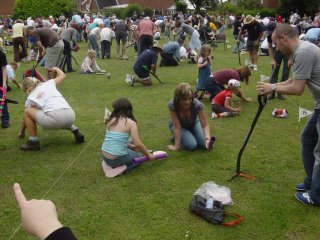Looking Back
Being
One of the last events of my year as Cheshire Poet Laureate was to read a poem at the Youth Parliament Elections in County Hall. As well as about a hundred young people and various senior members of the Council, six Westminster MPs were there to answer questions on youth issues. Two minutes before the results were announced came my poem. A year ago, I could not have even envisaged this scene.
The Cheshire Poet Laureate scheme sets out to introduce poetry to new audiences, and also to give one poet a high degree of support in their development. I have experienced these two aspects in all kinds of surprising ways. Poetry on Holmes Chapel Library windows, on thousands of bookmarks, read to MPs and worm-charmers, shared on the radio, and above all to thousands of visitors to the ‘Lines on the Map’ web site, has certainly reached a new audience.
I took on the post with the inevitable apprehension. It’s not just about writing poems, but also involves a lot of high-risk engagements with groups of people who are unknown quantities. It is very definitely a venture into the open, away from the private page and into all kinds of social arenas. One immediate worry: would I be able to ‘write to order’? – something I had rarely done before. In the event, I was delighted to find that the commissions and deadlines brought out some of my best work – possibly because it forced me into an occasional discipline of writing which is often crowded out by the day job.
I have begun to understand a much wider role for poetry, in catalysing social interaction, and providing public words for important moments. This was clearest in the Manley ‘Commonplace’ project – where I got a sense that poetry could gather and make articulate the corporate memory of a community. I think my work – what I write and what I take on – will be subtly different as a result.
During the year I have also experienced an increase in ambition for my work – not just in acceptance or publication, but in a desire to try out larger forms, sequences, to do something different from my previous work. The Poetry Masterclass at Tŷ Newydd was excellent – not in offering new skills so much as providing a creative space and an inspiring peer group. Many of the poems in my book originated in that week.
Producing the book has been a real culmination. Not having published before, I hadn’t realised the confidence-boost and ‘solidity’ of reading from a published and substantial volume. The process – although I could have done with another six months – was very helpful in getting a sense of what my work is, what are its strengths and weaknesses, and what are the requirements of reaching a wider audience.
I want to thank all those involved in this scheme – previous incumbents, who are beginning to form an influential network as a group; Anne Sherman for continual support; and Cheshire County Council for maintaining such an innovative and enriching scheme, whose effects, though subtle, will be long-lasting and deep in the literary life of our County.
Labels: cheshire laureate book



